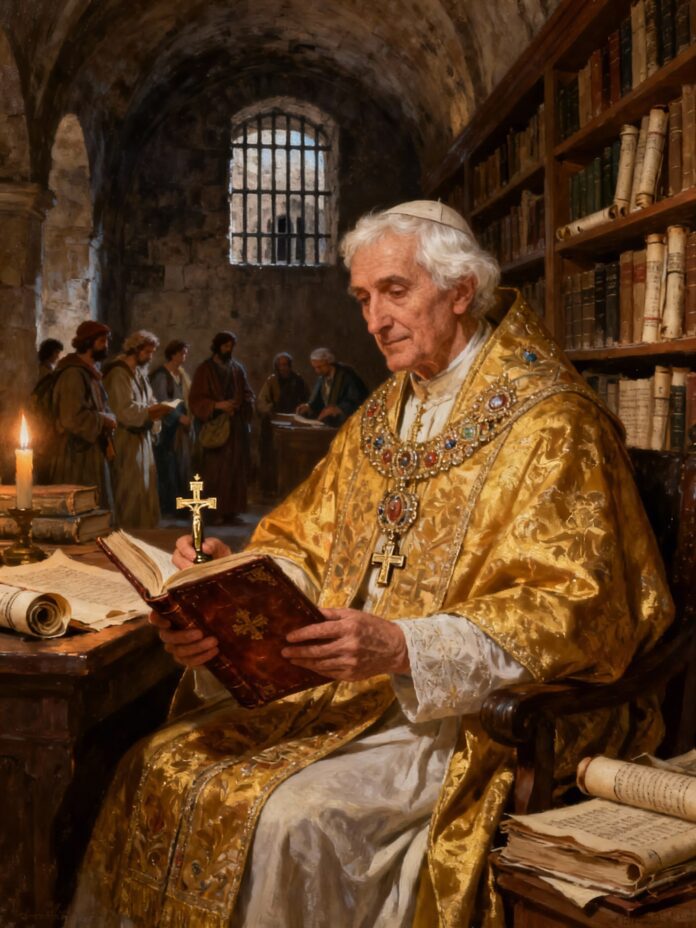A native of Cappadocia, Alexander distinguished himself by a twofold fidelity: to intellect and to charity. Bishop of Jerusalem at the heart of the tensions between Jewish Christians and pagan converts, he made culture a path to communion. Founder of a library and a catechism school, he welcomed seekers of the spirit and of faith, among them Origen. His gentleness endured persecution. His martyrdom, around 250, sealed a legacy of unity between knowledge and holiness.
To found, to teach, to suffer: Alexander of Jerusalem embodies a faith that instructs without dominating. In times of persecution, he preferred to form free consciences rather than soldiers of doctrine. Rooted in the Holy Land, he fostered a dialogue between Greek reason and biblical hope. Today, his example invites us to unite study and prayer, to transmit the faith as a shared light, not an exclusive torch.
Sowing the light of knowledge
Born in Cappadocia at the end of the 2nd century, Alexander was first a bishop in his native region. A proud disciple of Clement of Alexandria, whom he welcomed into exile, he learned from him the love of knowledge placed at the service of faith. Around the year 212, while on pilgrimage to Jerusalem, he was approached to assist Bishop Narcissus, who was too old to continue his ministry alone.
His reputation as a cultured and peaceful man spread throughout the community. Having become Bishop of Jerusalem, Alexander reunited the faithful who had been scattered by internal divisions and mistrust between Christians of Jewish and pagan origin. He understood that faith can only prevail by making itself understandable.
He founded the Jerusalem library—one of the first in the Christian world—and a catechism school open to debate and the reading of Scripture. He protected Origen, a great but sometimes controversial thinker, and ordained him a priest in Caesarea.
Under Emperor Decius, around 250 AD, decrees of persecution swept across the Near East. Alexander, an elderly man with white hair, was arrested and taken to Caesarea. There, according to Origen's account, he edified even the guards with his gentleness and died in chains, leaving behind the legacy of a learned and loving pastor.
The patience of the wise
Local traditions tell of an angel guiding Alexander to Jerusalem, a sign of his calling to unite two worlds: Greek scholarship and the Hebrew faith. Another legend recounts that every evening, from the city walls, he would bless the Holy City, reciting psalms of peace.
The facts are certain: he established a school and a library, he welcomed Origen, and he died a prisoner of his fidelity to Christ. His legend, however, reflects a conviction: true science becomes prayer when it is united with charity. His image as a bishop bent over books embodies this alliance between the pursuit of truth and lived love.
Spiritual message
Learn without pride, believe without fear: this is Alexander's lesson. His life shows that intelligence nourishes faith when it is rooted in patience. Like a lamp placed on a lectern, knowledge illuminates those who listen to it. Today, he invites us to pray before arguing, to engage in dialogue before judging, to teach in inner peace. True light does not flicker; it perseveres.
Prayer
Lord, you who granted Saint Alexander peace of mind amidst battles, grant us to seek the truth with humility. Give your Church gentle and courageous pastors, who know how to instruct without coercing. Teach us to unite knowledge with charity, faith with reason, so that our witness may be a light in the world. Through Jesus Christ, the living. Amen.
To live
- Read a passage from the Gospel while meditating on a sentence with calm and silence.
- Offering a gesture of gratitude to a teacher, priest or trainer.
- Spend ten minutes contemplating one's own relationship to knowledge and faith.
Memory
Alexander's memory is honored in Jerusalem and Caesarea. Ancient writings mention a venerated tomb on the coastal road to Palestine. His library, destroyed in the 4th century, later inspired the library in Caesarea founded by Pamphilus and dedicated to Origen. Byzantine mosaics depict his image with white hair in several Eastern churches. In Cappadocia, his birthplace is cited in local traditions as a place of refuge for pilgrims. He remains the symbolic patron of Christian libraries and scholars of theology.
Liturgy
- Readings/psalm: Wisdom 7:7-14; Psalm 118, “Your word is a lamp to my feet”.
- Song/hymn: “O Joyful Light” (office of vespers).



